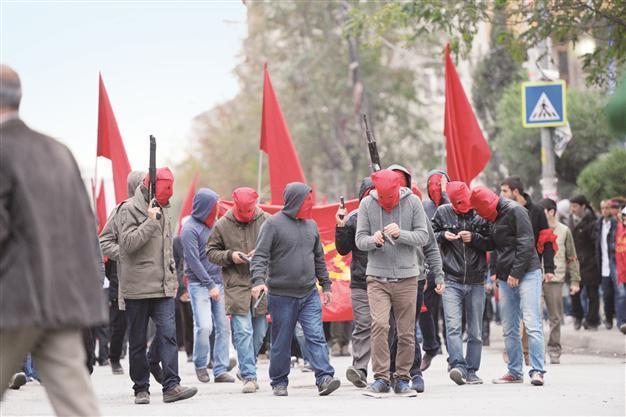US report cites DHKP/C, puts less emphasis on PKK
WASHINGTON

The report said that Turkey had increased its cooperation with European countries regarding the status of members of the outlawed Revolutionary People’s Liberation Party/Front (DHKP/C).
The U.S. State Department has highlighted the outlawed Turkey-based Revolutionary People’s Liberation Party/Front (DHKP/C) in its annual terrorism report, placing the militant group in the “key terrorism trends” section. The report, however, puts less emphasis on the outlawed Kurdistan Workers’ Party (PKK).The State Department’s 2013 Country Reports on Terrorism stated that the number of terrorist attacks around the world rose last year to more than 9,700, up 43 percent from 6,700 in 2012. But officials cautioned that even though some 17,800 people had been killed, up from 11,000 in 2012, most of the attacks were smaller and more localized than in past years. The report also said losses sustained by al-Qaeda’s core leadership in Pakistan and Afghanistan had “accelerated” the network’s decentralization in 2013, resulting in more autonomous and more aggressive affiliates in Yemen, Syria, Iraq, northwest Africa, and Somalia. “While terrorism by non-state actors related to al-Qaeda and state-sponsored terrorism originating in Iran remained the predominant concern of the United States, other forms of terrorism undermined peace and security around the world,” the report said, citing the DHKP/C’s responsibility for a number of high-profile attacks in 2013, including exploding a suicide vest inside the employee entrance to the U.S. Embassy in Ankara on Feb. 1. The report added that Turkey had increased its cooperation with European countries regarding the status of members of the DHKP/C.
Peace process with PKK
Compared to previous years, the report put less emphasis on the PKK, referencing the peace process talks between the government and PKK leader Abdullah Öcalan that began in late 2012.
“During the first half of 2013, Iraq, Turkey, and the United States continued a trilateral security dialogue as part of ongoing efforts to combat the PKK in the region. As part of peace process negotiations between the Government of Turkey and jailed PKK leader Abdullah Öcalan, hundreds of PKK fighters left Turkey and entered the Iraqi Kurdistan Region in northern Iraq starting in May,” it said.
The report also described the bombing in the Turkish town of Reyhanlı near the Syrian border, in which 52 people died, as the “most significant [terror] incident in the country’s modern history.”
It said Turkey was working closely with European, North African, and Middle East countries to interdict potential foreign fighters planning to travel through Turkey to Syria, although it remains a transit route for foreign fighters. The report said a major challenge to Europe was the increasing travel of European citizens – mostly young men – to and from Syria seeking to join forces opposing the al-Assad regime.
“Many of them ended up in the ranks of violent extremist groups such as the al-Nusra Front or the Islamic State of Iraq and the Levant (ISIL). These ‘foreign fighters’ sparked increasing concerns, and actions to address them, by European countries worried about the growing number of their citizens traveling to the battlefield and possibly returning radicalized,” it said.
The most lethal terrorist attacks in 2013 were conducted by the Taliban in Afghanistan, the Pakistani Taliban, Nigeria’s Boko Haram, al-Qaeda in Iraq, al-Qaeda in the Islamic State of Iraq and the Levant, and al-Qaeda in the Arabian Peninsula, according to the report.
















